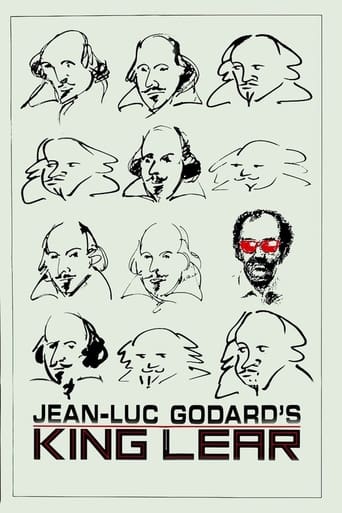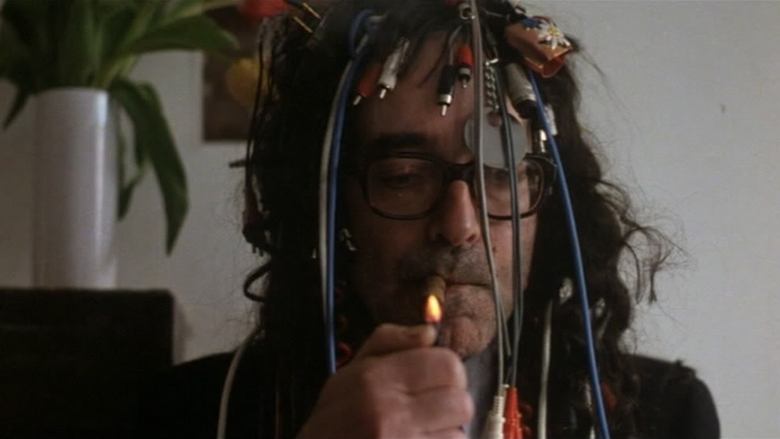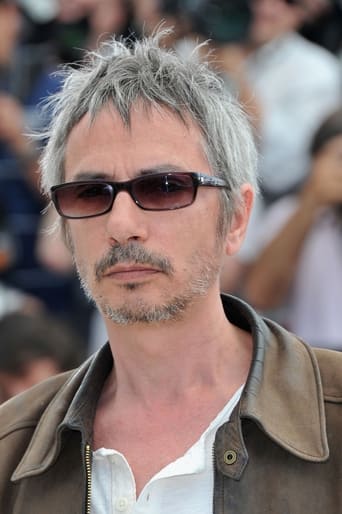

King Lear (1987)
A descendant of Shakespeare tries to restore his plays in a world rebuilding itself after the Chernobyl catastrophe obliterates most of human civilization.
Watch Trailer
Cast
Reviews
Very well executed
Highly Overrated But Still Good
Brilliant and touching
Bad Acting and worse Bad Screenplay
Everything returns to normal after Chernobyl. That is, everything but art. Most of the great works are lost, and it is up to people like William Shakespeare Junior the Fifth to restore the lost artwork of the human race. He finds strange goings-on at a resort enough to remind him of all the lines of the play, dealing with mob boss Don Learo and his daughter Cordelia, a strange professor named Jean Luc-Godard, who repeatedly xeroxes his hand for no particular reason.I gave this film a low rating primarily because of the way I saw it, with a low quality of picture and sound. I think there is a lot of potential here, but I wasn't fully able to enjoy it. Oddly, I don't think any people have seen this film, despite the names involved. Woody Allen? Norman Mailer? Molly Ringwald? This should be a cult classic. Has it received a proper release?
This must be a candidate for the most difficult film ever made. Great reviewers can't make head nor tail of it. It's Godard's own Finnegan's Wake-like dreamscape of the making of a film on the theme of King Lear, beginning with the contract, ending with the editing - a project that apparently turned into a nightmare. Hence the disjointed narrative, Alice in Wonderland elements, weird juxtapositions, elaborate pseudo-philosophies - all familiar components of delirious semi-consciousness. It's an anti-film, a film made deliberately to be disliked as much as it dislikes itself. Just as Godard's film about Lausanne, Lettre a Freddie Buache, consists of his refusal to make a film about Lausanne, so King Lear is his refusal to make the Lear required of him, while contract bound to make something.It opens with an actual phonecall from the producer giving Godard a roasting for failing to deliver the film. The film that follows is Godard's response and is basically a middle finger to the Cannon Group and everyone else, focussing as it does, on the key word in the play: Nothing.In the opening scenes, Norman Mailer and his daughter discuss the King Lear script he has just finished. It's unclear whether Mailer's actual script was ever going to be used, assuming he wrote one, or why Mailer himself would want to act the part, or why Godard would ever have agreed to make a film written and acted by Norman Mailer. Obscurities matched only by the resulting film itself. In any case it wasn't going to work. Perhaps to deliberately abort the project, Godard quickly succeeded in pissing off the Mailers who left in a huff. Godard blames the petulance of 'the great writer' and his daughter's inability to handle the pressure from various sides, including her father. That's one hell of an opening for a film, leaving us blinking and wondering what is going to happen, or not happen, next.A kind of story pops up. A descendant of Shakespeare (Peter Sellars) is trying to recreate the Bard's works after all art has been lost in a nuclear catastrophe. In a Swiss hotel he finds Burgess Meredith and Molly Ringwald, vaguely recognised as Lear and Cordelia (power and virtue in contest), and from whom he gradually reconstructs the play. Mailer's idea of making Lear a mafia don resurfaces here. Meanwhile, Sellars is in pursuit of the mad Professor Pluggy (Godard, in a truly bizarre performance) who has crucial knowledge of how images should complement the words.Pluggy's long and solemn thesis on words, images and reality is at the centre of the film. Life and images of life.Telling and showing. There is more than recreating a universe of words (says Pluggy). Images are purer. Images serve to connect two realities and meaning is created by reconciling these two realities. Their coming together in image form releases the emotive power. Contrary realities (Lear and Cordelia) don't come together. The strength of an image lies in the association of ideas it contains. Bringing them together is the function of the artist. This presumably also applies to sound - the use of sound in the film is astonishing - layered, atmospheric, and apparently insane - and presumably explains the seagulls that are heard at random intervals, even during interior scenes. This is all dream-theory. Barely understandable on a single viewing - perhaps complete gibberish - yet key to what the film is about: the struggle of the artist to create.At the end, Woody Allen is splicing the film with safety pins while reciting an irrelevant Sonnet - a final swipe at the Americans who clearly should never have messed with Godard in the first place. His response was to deliver something that is probably Nothing with an artistic fiendishness ungraspable by mere mortals. According to your fondness for the director, it's either highly entertaining or unendurable punishment.
The first time I saw this, I really disliked it. Even compared to Godard's other ramblings of the 70's, it was still a little too disparate. But the second time gelled this movie for me and now I truly love this film. It's a wonderful brainstorm about the nature of film and the inherent capacity of art to reform itself. In other words, everything that's being said or will be said has already been said; sounds bleak at first, but it's actually comforting, because then art becomes truly universal and languageless.
No Plot. Four characters who don't interact. Nothing happens. Peter Sellars walks around and thinks. His recurring voice-over monologue obsessively examines a thought that is not very interesting to begin with. Not content merely to bore us, Goddard assaults us with shot after shot of crudely filmed, irrelevant imagery, accompanied by unintelligible overlapping speech. Perhaps there's something resembling an idea buried underneath all the nonsense. But I doubt it. And what does any of this have to do with 'King Lear'? To be bored by a film is bad enough, but this film is aggressively, offensively, violently boring.


